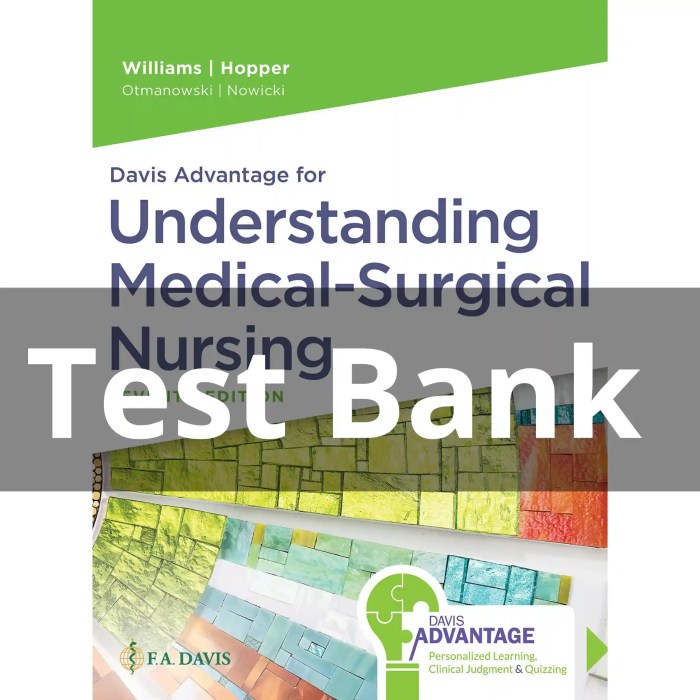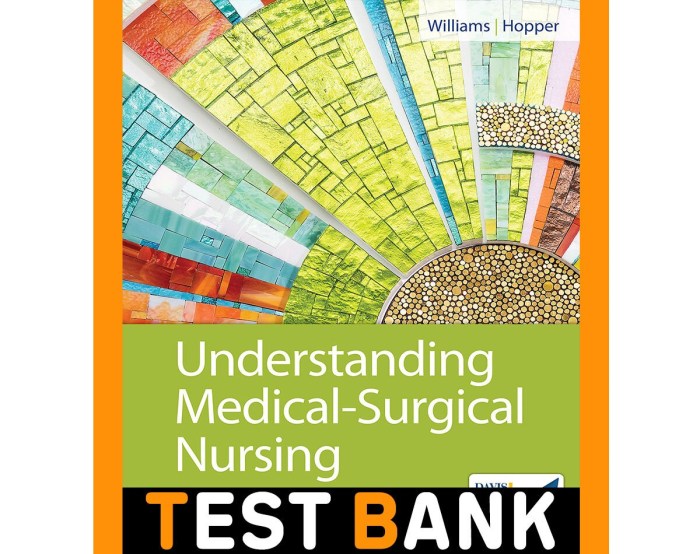Understanding medical-surgical nursing 7th edition – Understanding Medical-Surgical Nursing: A Comprehensive Guide to Holistic Patient Care, 7th Edition, offers a comprehensive and engaging exploration of the fundamentals and practices of medical-surgical nursing. This essential resource empowers nurses with the knowledge and skills necessary to provide exceptional patient care in various healthcare settings.
This book provides a thorough examination of core concepts, assessment and monitoring techniques, pharmacology principles, pathophysiology, patient education strategies, and ethical and legal considerations. With its updated content and evidence-based approach, this 7th edition remains an indispensable resource for nurses seeking to advance their knowledge and practice.
1. Core Concepts of Medical-Surgical Nursing
Medical-surgical nursing is a specialized field of nursing that focuses on providing care to patients with acute or chronic medical-surgical conditions. It encompasses a broad range of responsibilities, from assessing and monitoring patients to administering medications and providing wound care.
Role of the Medical-Surgical Nurse
The role of the medical-surgical nurse is to provide holistic patient care, which includes addressing the physical, emotional, and psychological needs of patients. Medical-surgical nurses work closely with physicians and other healthcare professionals to develop and implement treatment plans, monitor patient progress, and educate patients and their families about their conditions and care.
Key Responsibilities and Scope of Practice
- Assessing and monitoring patients
- Administering medications
- Providing wound care
- Educating patients and their families
- Collaborating with other healthcare professionals
2. Assessment and Monitoring in Medical-Surgical Nursing
Systematic Approaches to Patient Assessment
Patient assessment is a systematic process that involves gathering information about a patient’s health status. This information is used to develop a plan of care that is tailored to the individual patient’s needs. The three main components of patient assessment are:
- Health history
- Physical examination
- Laboratory and diagnostic tests
Techniques and Tools for Data Collection
There are a variety of techniques and tools that can be used to collect patient data. These include:
- Interviewing the patient
- Observing the patient
- Palpating the patient
- Auscultating the patient
- Percussing the patient
Importance of Accurate and Timely Documentation, Understanding medical-surgical nursing 7th edition
Accurate and timely documentation is essential for patient safety and quality of care. Nurses are responsible for documenting all aspects of patient care, including the patient’s assessment, treatment, and response to treatment. This documentation provides a record of the patient’s care and can be used to track progress, identify problems, and make decisions about future care.
3. Pharmacology in Medical-Surgical Nursing
Principles of Pharmacology and Medication Administration
Pharmacology is the study of drugs and their effects on the body. Medical-surgical nurses must have a thorough understanding of pharmacology in order to safely and effectively administer medications to patients. The principles of pharmacology include:
- Drug absorption
- Drug distribution
- Drug metabolism
- Drug excretion
Routes of Medication Administration
Medications can be administered through a variety of routes, including:
- Oral
- Intravenous (IV)
- Intramuscular (IM)
- Subcutaneous (SC)
- Transdermal
Potential Adverse Effects of Medications
All medications have the potential to cause adverse effects. The most common adverse effects of medications include:
- Nausea and vomiting
- Diarrhea
- Constipation
- Dizziness
- Headache
4. Pathophysiology and Management of Common Medical-Surgical Conditions: Understanding Medical-surgical Nursing 7th Edition
Overview of Common Medical-Surgical Conditions
Medical-surgical nurses care for patients with a wide range of medical-surgical conditions. Some of the most common medical-surgical conditions include:
- Cardiovascular disease
- Pulmonary disease
- Gastrointestinal disease
- Genitourinary disease
- Musculoskeletal disease
Nursing Interventions and Strategies for Promoting Patient Recovery
Nurses play a vital role in promoting patient recovery from medical-surgical conditions. Nursing interventions and strategies for promoting patient recovery include:
- Providing wound care
- Administering medications
- Educating patients and their families
- Monitoring patient progress
- Collaborating with other healthcare professionals
Table of Key Information about Different Medical-Surgical Conditions
| Condition | Pathophysiology | Clinical Manifestations | Management |
|---|---|---|---|
| Cardiovascular disease | Narrowing or blockage of blood vessels | Chest pain, shortness of breath, fatigue | Medications, surgery, lifestyle changes |
| Pulmonary disease | Damage to the lungs | Shortness of breath, coughing, wheezing | Medications, oxygen therapy, respiratory therapy |
| Gastrointestinal disease | Inflammation or damage to the digestive system | Abdominal pain, nausea, vomiting, diarrhea | Medications, diet, surgery |
| Genitourinary disease | Infection or damage to the urinary or reproductive system | Painful urination, frequent urination, discharge | Medications, surgery |
| Musculoskeletal disease | Damage to muscles, bones, or joints | Pain, swelling, stiffness | Medications, physical therapy, surgery |
5. Patient Education and Discharge Planning

Principles of Patient Education
Patient education is an essential part of medical-surgical nursing. Nurses must be able to effectively educate patients and their families about their conditions, treatments, and medications. The principles of patient education include:
- Using clear and concise language
- Tailoring the education to the individual patient’s needs
- Providing written and verbal information
- Answering patients’ questions
- Encouraging patients to ask questions
Strategies for Developing Effective Patient Education Materials
There are a variety of strategies that can be used to develop effective patient education materials. These strategies include:
- Using simple language and visuals
- Breaking down information into small chunks
- Providing examples and case studies
- Including interactive elements
- Getting feedback from patients
Process of Discharge Planning
Discharge planning is a process that begins when a patient is admitted to the hospital. The goal of discharge planning is to ensure that the patient has a safe and smooth transition from the hospital to home. The discharge planning process includes:
- Assessing the patient’s needs
- Developing a discharge plan
- Educating the patient and their family about the discharge plan
- Coordinating with other healthcare professionals
- Following up with the patient after discharge
6. Ethical and Legal Considerations in Medical-Surgical Nursing

Ethical Principles Guiding Medical-Surgical Nursing Practice
Medical-surgical nurses must adhere to a number of ethical principles in their practice. These principles include:
- Autonomy
- Beneficence
- Nonmaleficence
- Justice
Nurse’s Role in Ensuring Patient Autonomy
The nurse’s role in ensuring patient autonomy is to respect the patient’s right to make decisions about their own care. This includes providing the patient with information about their condition and treatment options, and supporting the patient’s decisions, even if the nurse does not agree with them.
Legal Implications of Medication Errors
Medication errors are a serious problem in healthcare. Nurses must be aware of the legal implications of medication errors and take steps to prevent them from occurring. The legal implications of medication errors include:
- Civil liability
- Criminal liability
- Administrative liability
FAQ Section
What are the key responsibilities of a medical-surgical nurse?
Medical-surgical nurses are responsible for providing holistic patient care, including assessment, monitoring, medication administration, patient education, and discharge planning.
How does this book address ethical and legal considerations in medical-surgical nursing?
The book dedicates a chapter to ethical and legal principles, discussing topics such as patient autonomy, informed consent, confidentiality, and the legal implications of nursing interventions.
What are the benefits of using a systematic approach to patient assessment and monitoring?
A systematic approach ensures comprehensive and accurate data collection, allowing nurses to identify patient needs, track progress, and make informed decisions regarding care.